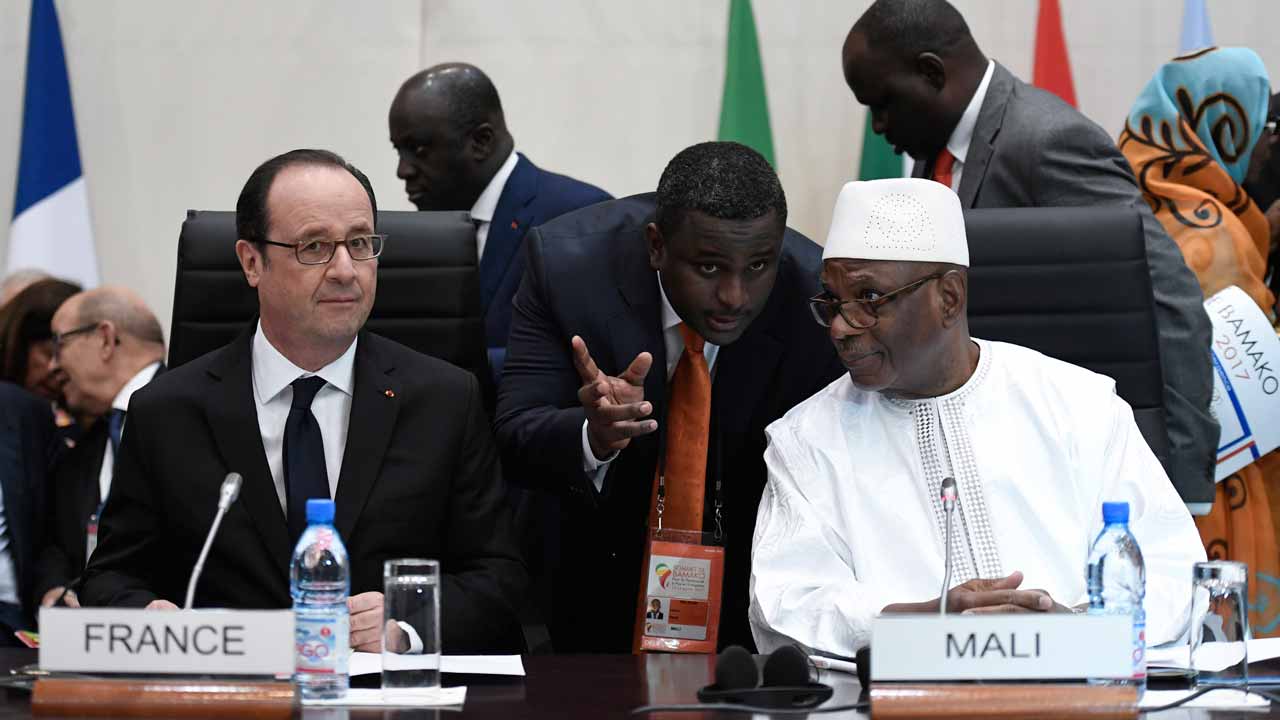
STEPHANE DE SAKUTIN / AFP
The Gambia’s political crisis dominated a Mali summit on Saturday as Gambian president-elect Adama Barrow appealed to west African leaders for help ending the impasse.
Barrow flew to Bamako unexpectedly on Friday after holding crisis talks in Banjul with Nigerian President Muhammadu Buhari, Liberian leader Ellen Johnson Sirleaf and Ghana’s John Mahama.
Malian and Ghanaian sources confirmed to AFP heads of state had received Barrow on the margins of the summit.
The leaders of at least 30 nations gathered at the Africa-France summit in Bamako to discuss a range of issues including the fight against jihad, governance challenges and Africa’s impact on the European migrant crisis.
West African heavyweights met just on Friday in Banjul with Gambian President Yahya Jammeh, who has refused to cede power after disputing the result of a December 1 election that Barrow won.
The Economic Community Of West African States (ECOWAS), a 15-nation bloc, has repeatedly called on Jammeh to respect the result of the vote and step down after 22 years in power.
The spectre of a military intervention rose after declarations by the United Nations and African Union that boots on the ground could get the green light if the situation is not rapidly resolved.
Mohamed Ibn Chambas, head of the UN Office for West Africa and the Sahel, said on Friday that ECOWAS would ask the Security Council to approve the deployment of troops to The Gambia if Jammeh continues to refuse to leave office.
Meanwhile, West African defence chiefs have met in Abuja to discuss the crisis, Nigeria’s chief of defence staff said, “as part of efforts to mitigate the political impasse,” notably including neighbouring Senegal.
In a sign of Barrow’s growing international clout, a French diplomatic source told AFP that President Francois Hollande “intends to meet” the former businessman.
There are just four days left of Jammeh’s five-year term, but he warned the international community on Tuesday that “undue external interference” was unnecessary.
Jammeh has made it clear he will not stand aside until the country’s Supreme Court decides on his legal challenge seeking to annul the result of last month’s polls, which he had initially conceded.
The ruling is unlikely to happen before May.
– Jihadist threat –
Many of the nations attending the summit were once colonies of France, which in recent years has boosted its military involvement on the continent.
Also present were Zimbabwean President Robert Mugabe and Rwandan leader Paul Kagame, who have a particularly tense relationship with Paris.
It was Hollande’s last trip to Africa as president before his term ends, and Malian President Ibrahim Boubacar Keita described him as the “most loyal” of French presidents to the continent.
Hollande celebrated the fact that “terrorists no longer control any (Malian) territory, democracy has returned and elections have taken place”, but Mali remains one of the world’s most fragile states.
In a bid to help crush the jihadist threat, France has trained more than 20,000 African soldiers every year since 2013, according to a French diplomatic source.
By 2020, the number of French-trained troops is expected to reach 25,000 a year.
The training drive aims to minimise the need for direct military interventions in African conflicts, such as those launched in Mali and the Central African Republic in 2013.
– Child killing controversy –
However, the situation in key nations such as Mali remains far from stable, where France’s continued military presence is not universally welcome.
Overshadowing the summit was an admission by the French defence ministry on Friday that French soldiers deployed to northern Mali had killed a child during a counter-terror operation in November.
According to the French-language magazine Jeune Afrique, the victim was buried in secret by the soldiers.
French Defence Minister Jean-Yves Le Drian promised a enquiry into the death speaking to journalists at the summit, and emphasised that the child in question was part of an armed group attempting to kill French soldiers.
“We decided to fire to save the life of our French soldiers,” Le Drian said, adding he only learnt a minor was involved weeks later.
The boy’s family say he was a 10 years old and was simply guarding donkeys.



